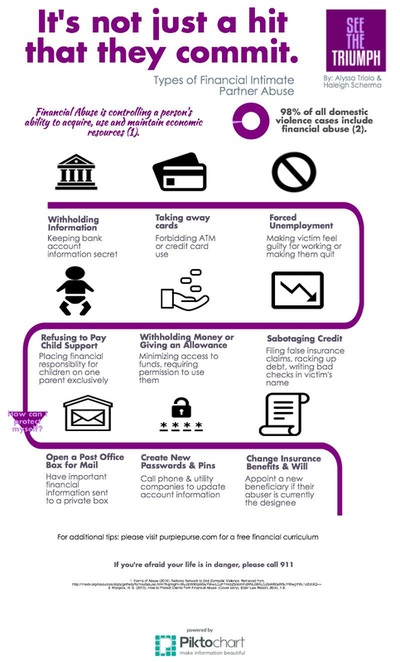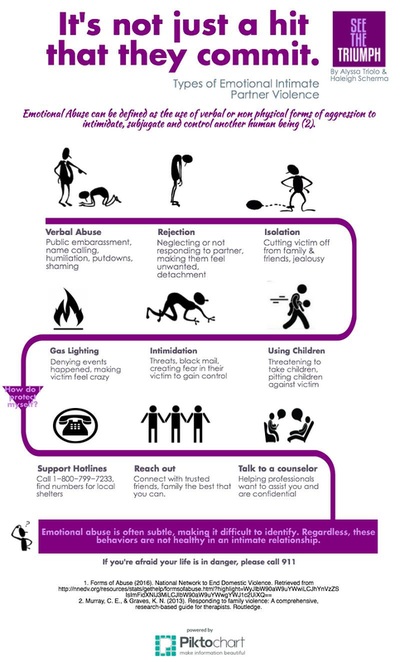|
10/18/2016 It's Not Just a Hit That They CommitBy Alyssa Triolo and Haleigh Scherma, See the Triumph Guest Bloggers
While there are plenty of instances of domestic violence on the news and in the media, the cases that capture the headlines often don’t reflect many of the realities that victims of abuse face daily. What comes to mind when we say domestic violence or spousal abuse? Black eyes? Bloody lips? Maybe even some bruises? Certainly, these are included in the definition of an abusive relationship and are among the most visible signs of danger, but there are far more examples of abuse that are overlooked, often because they are less visible to the outside world. While statistics differ from study to study, about 25% of women in the United States have experienced domestic physical abuse, but that number is minute compared to the many more that have been victims of emotional and/or financial abuse (FTI Consulting, 2014). Part of the reason these two types of abuse have fallen under the radar is due to how subtle they can be. Emotional abuse is defined as the use of verbal or nonphysical forms of aggression to intimidate, subjugate, and control another human being (Jacobson & Gottman, 1998, p. 148). It can appear in many forms, from name calling to intimidation or even an inconspicuous threatening glare. Part of the reason this type of abuse is so damaging is due to the fact it has long-lasting effects on a victim’s self-esteem. When working with clients who have experienced intimate partner violence, we’ve noticed that they often say the same thing: the physical bruises healed, but the words still hurt. Financial abuse is controlling a person’s ability to acquire, use, and maintain economic resources (Tisdale, 2016). It is extremely common in intimate partner violence relationships, far surpassing the prevalence of physical violence. However, the vast majority of the population, 75%, do not connect financial abuse with intimate partner violence. In fact, nearly 98% of those who have experienced domestic violence have also been victims of financial abuse (Margolis, 2015). Financial abuse fosters dependence on the abuser. Some of the more obvious forms are controlling finances, withholding account information, preventing victims from holding a job or taking away ATM cards, giving their victims an allowance, or even stealing their identities and ruining credit by filing false claims and racking up credit card debt. The effects of financial abuse can be detrimental to the recovery process after leaving the relationship. One study found that, on average, people lose $30,000 from financial abuse, and 10% of victims lost more than $100,000 (Margolis, 2015). Just because emotional and financial abuse can’t be seen overtly does not mean they don’t warrant our attention. Around 58% of Americans believe that the news media and entertainment industry have a responsibility to shed light on domestic violence, yet around 3 in 4 people believe they are not discussing it enough and are inaccurately portraying it (FTI Consulting, 2014). So, what can we do? How can we protect ourselves and our loved ones from abuse like this? How do we help friends and neighbors who are struggling with emotional and/or financial abuse? If you suspect a friend or loved one might be experiencing financial or emotional abuse, there are ways you can help. One of the most important things you can do is be a source of nonjudgmental support for them. It’s okay to express your concern for their safety. However, it’s important to avoid pressuring them to take your help. Remember, they have been coping with this struggle for this long, and they are the expert in their own lives. Asking how you can help is better than taking charge and falling into the same power dynamics of someone else controlling their life. More tips and information can be found through the Allstate Purple Purse Foundation and the National Network to End Domestic Violence. Even if a victim does not feel ready to take action, just knowing that what they are experiencing is abuse can be validating and may plant a seed for change. Alyssa Triolo received her Master’s degree in Counseling with a specialty in Couple and Family Counseling from the University of North Carolina at Greensboro. She has worked for the past year with women who are domestic violence survivors and women who were living in a domestic violence shelter. She is currently pursuing her license as a Professional Counselor with the hope of working with clients on improving their mental health and wellness. Haleigh Scherma is an alumna of The University of North Carolina at Greensboro's Couple and Family Counseling Program where she interned as a sex therapist for couples and individuals struggling with intimacy and relationship issues. Currently, she is employed as a couples counselor, sex and intimacy therapist at Thrive Couples and Family Counseling Services in Denver, CO. References
Comments are closed.
|
Archives
July 2024
CategoriesAll About Intimate Partner Violence About Intimate Partner Violence Advocacy Ambassadors Children Churches College Campuses Cultural Issues Domestic Violence Awareness Month Financial Recovery How To Help A Friend Human Rights Human-rights Immigrants International Media Overcoming Past Abuse Overcoming-past-abuse Parenting Prevention Resources For Survivors Safe Relationships Following Abuse Schools Selfcare Self-care Sexual Assault Sexuality Social Justice Social-justice Stigma Supporting Survivors Survivor Quotes Survivor-quotes Survivor Stories Teen Dating Violence Trafficking Transformative-approaches |
Search by typing & pressing enter




 RSS Feed
RSS Feed